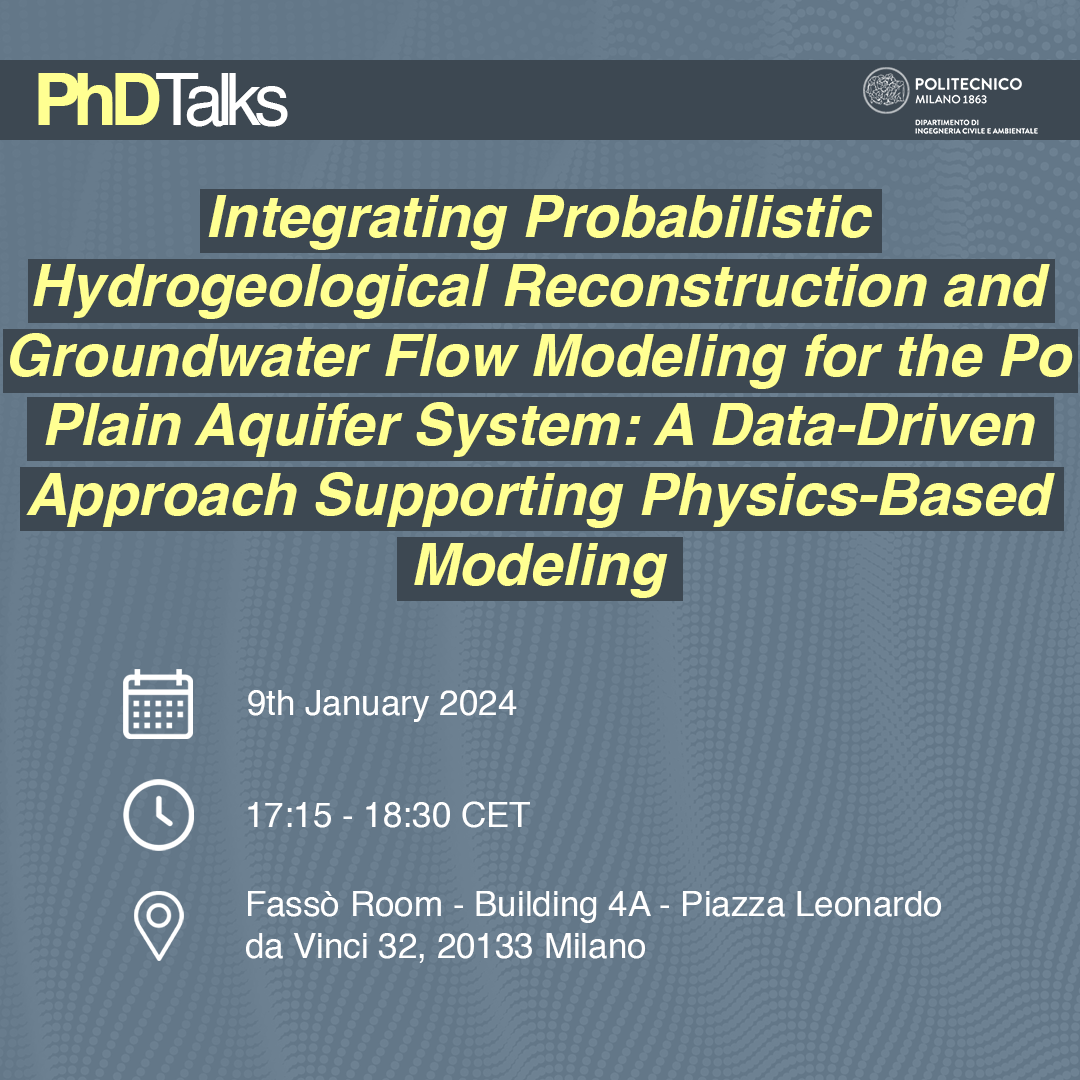
- Questo evento è passato.
PhDTalks | Integrating Probabilistic Hydrogeological Reconstruction and Groundwater Flow Modeling for the Po Plain Aquifer System: A Data-Driven Approach Supporting Physics-Based Modeling
9 Gennaio 2024 @ 17:15 - 18:30

Il prossimo appuntamento con la serie di incontri PhDTalks si terrà Martedì 9 gennaio nell’aula Fassò (Edificio 4A), dalle 17:15 alle 18:30 CET.
PhDTalks è una serie di seminari e discussioni tra dottorandi. Gli eventi hanno lo scopo di fornire un luogo dove creare un network tra dottorandi ed entrare in contatto con i molti progetti sviluppati nel nostro dipartimento.
Lo speaker Andrea Manzoni condurrà un seminario dal titolo “Integrating Probabilistic Hydrogeological Reconstruction and Groundwater Flow Modeling for the Po Plain Aquifer System: A Data-Driven Approach Supporting Physics-Based Modeling”.
Al termine dell’evento sarà disponibile un piccolo rinfresco finanziato dal dipartimento.
Sarà possibile seguire la conferenza anche online al seguente link.
Abstract
I present a study related to the modeling of large-scale groundwater flow and contaminant transport in porous media. The techniques presented are designed to efficiently handle a large volume of data by combining knowledge of system physics with the increasingly availability of innovative artificial intelligence techniques. The study is divided into three main phases.
In the first phase, a probabilistic hydrogeological reconstruction is carried out on a large-scale system, specifically for the Po River basin in Italy. This reconstruction is accomplished using artificial intelligence techniques that have been appropriately adapted to realize the hydrogeological reconstruction and quantify its associated uncertainty. These findings serve as input for the second phase of the study, which focuses on developing a flow model. To achieve this, we have developed a methodology for calibration and sensitivity analysis of large-scale groundwater flow models. This methodology includes the application of state-of-the-art optimization algorithms and posterior sensitivity analysis, which provide information on the sensitivity of the model output (hydraulic load) to variations in parameter values after the calibration phase. The case study for this methodology is the Po River basin, for which a groundwater flow model has been developed based on available measurements in the region, including hydraulic head measurements, satellite precipitation data, temperature, land use, and continental-scale models of soil properties and crops.
Finally, the third phase focuses on the development of a deep learning-based methodology aimed at identifying preferential pathways for contaminants in porous media and utilizing the information within these pathways to determine the arrival time of the first quantity of contaminant in a region of interest. This methodology serves as a foundation for the development of artificial intelligence-based methodologies for identifying pathways and travel times of contaminants within aquifers in highly complex systems, as the system analyzed in the first two phases of this study.
Speaker’s bio
Andrea Manzoni is a Ph.D. candidate in Environmental and Infrastructure Engineering at Politecnico di Milano, with a Master of Science in Energy Engineering, specializing in oil and gas production from the same institution.
His research covers a diverse range of topics. This includes complex models, groundwater flow, contaminant transport, large-scale models, stochastic inverse modeling, sensitivity analysis, multiphase flow, data mining, remote sensing and on-site data analysis, applied machine learning, and computer vision.
His Ph.D. thesis focuses on developing a stochastic inverse modeling technique for a large-scale groundwater flow model applied to the groundwater system of the Po River watershed, as well as a deep learning technique for contaminant transport through porous media.
In 2023, Andrea Manzoni further enriched his expertise as a Visiting Scholar for 5 months at the University of Southern California (Los Angeles, US). During this time, he focused on contaminant transport, the cutting-edge applications of artificial intelligence techniques in computer vision and image processing, and uncertainty quantification applied to machine learning models.
In addition, Andrea Manzoni has held the position of Vice-President of the Society of Petroleum Engineers (SPE) Student Chapter at Politecnico di Milano since 2021.
